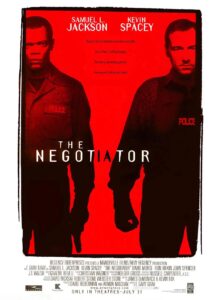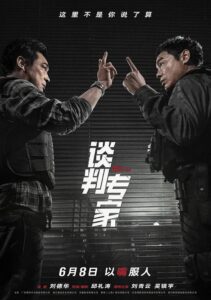Crisis Negotiators
谈判专家
China, 2024, colour, 2.35:1, 119 mins.
Director: Qiu Litao 邱礼涛 [Herman Yau].
Rating: 8/10.
A cracking, Hong Kong-set re-make of US drama-thriller The Negotiator that’s tighter and more involving than the original, with two terrific lead performances.
A city in China, 1993. A distraught couple, Chen Dalai (Liu Dehua) and his wife Zhang Qilian (Peng Xiuhui), hold two women hostage in the district social welfare department offices, demanding to know why their eight-month-old son has been taken away from them. They both have knives and threaten to blow the office up with an LPG cylinder. Chen Dalai has just been released from a psychiatric hospital. Chief police negotiator Xie Jiajun (Wu Zhenyu) takes some food to the couple and their hostages. When the couple are told their son has been adopted by a wealthy family, they blow themselves up. Three years later, on 18 Dec 1996 – the day after the death of veteran Hong Kong film director Li Hanxiang in Beijing – a bank raid goes wrong and one of the gang takes a woman hostage with a grenade. Police negotiator Zhuo Wenwei (Liu Qingyun) arranges a car for the robber, who ends up shot by a police sniper. Next day Zhuo Wenwei has a big birthday party, during which he’s told confidentially by an old colleague, Zhang Yongjia (Huang Debin), that he’s been tipped off that the Police Welfare Fund, on whose committee they both sit, is being scammed by insiders. Zhang Yongjia says Li Junjie (Zhou Wenjian), head of Internal Investigations, may be involved. When Zhuo Wenwei goes to meet Zhang Yongjia later that night, he finds him shot dead. And when Zhuo Wenwei tells his superior, Luo Anbang (Miao Qiaowei), about Zhang Yongjia’s information, he is told to keep it under his hat for the time being. After Zhang Yongjia’s funeral, the Crime Unit led by Li Zhibin (Jiang Haowen) and Internal Investigations led by Li Junjie raid Zhuo Wenwei’s flat, find incriminating documents, and arrest him on suspicion of Zhang Yongjia’s murder. He is held in detention and questioned, and even Luo Anbang begins to doubt his innocence. Zhuo Wenwei then manages to break out of police detention, and immediately goes to Li Junjie’s office, where he holds him hostage at gunpoint, along with three others who happen to be there – Li Junjie’s secretary Maggie (Yan Zhuoling), seedy police informer Lu Di (Yang Weilun), and Luo Anbang. Barricading the office, Zhuo Wenwei says he’ll only talk to Xie Jiajun, under whom he worked on the Chen Dalai case, after which Xie Jiajun left the police force to become a social worker.
REVIEW
 While trying to solve a case of internal corruption, a police negotiator changes sides and becomes a hostage-taker in Hong Kong-set Crisis Negotiators 谈判专家, a cracking thriller that’s gripping on both a personal and a dramatic level. Hong Kong writer-director Qiu Litao 邱礼涛 [Herman Yau] has taken the interesting but over-long US drama The Negotiator (1998) and tweaked and tightened it in clever ways, delivering a picture that’s 20 minutes shorter than the original and far more emotionally involving.
While trying to solve a case of internal corruption, a police negotiator changes sides and becomes a hostage-taker in Hong Kong-set Crisis Negotiators 谈判专家, a cracking thriller that’s gripping on both a personal and a dramatic level. Hong Kong writer-director Qiu Litao 邱礼涛 [Herman Yau] has taken the interesting but over-long US drama The Negotiator (1998) and tweaked and tightened it in clever ways, delivering a picture that’s 20 minutes shorter than the original and far more emotionally involving.
The super-prolific Qiu, 63, who’s directed almost 80 movies in the past 37 years – nine of them in the past six – shows no sign of slowing down, even though most of his films nowadays are major action dramas rather than the pulpy quickies that he specialised in earlier. Recognising many of the qualities of the original screenplay by James DeMonaco and Kevin Fox, Qiu’s (solo-credited) script sticks closely to it; and as well as improving it, he’s helped by a terrific cast of regulars, including two stars at the top of their game – Liu Qingyun 刘青云 [Lau Ching-wan] in the Samuel L. Jackson part and Wu Zhenyu 吴镇宇 [Francis Ng] in the Kevin Spacey one.
Wu, like Spacey, ends up quietly stealing the film; but Liu, who’s on screen much more, is a far more versatile actor than Jackson and thus manages to give the whole production a greater sense of balance and heft. Though funded 100% by Mainland companies, and partly shot in Mainland studios, it feels totally like a Hong Kong production, with megastar Liu Dehua 刘德华 [Andy Lau] as creative producer 监制 plus a cast and key crew from the SAR. Despite its qualities, it took only a polite RMB156 million at the Mainland box office, maybe because of the subject’s familiarity. But it’s undoubtedly Qiu’s best movie since Shock Wave 2 拆弹专家2 (2020).
The basic idea of a respected police negotiator – here Zhuo Wenwei (Liu Qingyun) – being forced to change sides after being framed for murder is a clever one: a professional sweet-talker, who knows all the tricks of the trade, becomes the hostage-taker. As a further twist, he says he’ll only deal with one specific negotiator – here the equally respected Xie Jiajun (Wu), now retired from the force – and together they end up solving the case of internal police corruption that led to Zhuo Wenwei’s current situation.
Wisely, Qiu doesn’t fiddle with the basic concept, with whole chunks of the original script reproduced almost verbatim. But his tweaks are smart. The first, and most important, is adding a prologue, set three years earlier, that shows the two principals on the same team when negotiating with a crazed couple holding social workers hostage (Liu Dehua in a guest cameo, plus theatre actress Peng Xiuhui 彭秀慧 [Kearen Pang], 29+1, as his hysterical wife). Xie Jiajun is the chief negotiator here, and Zhuo Wenwei has only a small supporting role, but importantly we see the two at work and the considerable skills of the former. (In the original, Spacey’s character doesn’t appear until almost an hour into the film, with no backgrounding and not even personally knowing Jackson’s character.)
Apart from this 14-minute prologue, Qiu also adds in an action sequence of Zhuo Wenwei escaping from police detention after he’s been framed for murder – a sequence that leads more naturally to him then going straight to the offices of Internal Investigations and holding its head hostage. (Also, thanks to a tiny insert during the earlier police raid on Zhuo Wenwei’s flat, we definitely know it was the II head who framed him.)
The other changes are more tonal or cultural rather than structural. Qiu’s version is much less emotionally full-on and personally aggressive than the US original, and has much more humour, especially in Wu’s seemingly laid-back performance as the retired negotiator brought in at Zhuo Wenwei’s request. With less noise and squabbling in general, there’s more opportunity to savour the characters – also helped by Qiu’s avoidance of the original’s close-up-heavy style.
Liu Qingyun and Wu, who’ve worked together for years, have terrific screen chemistry throughout, even when just talking on the phone, and their game of cat-and-mouse between two pros who know all the wrinkles is raised to a level that even Jackson and Spacey couldn’t quite reach. There’s much more of a sense of shared background between the two characters, which makes the eventual switch of sides by Xie Jiajun (who in Qiu’s version has already left the force to become a social worker) much more believable. A brief, added coda at the end underlines the comradeship, as well as ending the film on a lighter note.
Casting is strong down the line, with the ever-reliable Miao Qiaowei 苗侨伟 as Zhuo Wenwei’s boss; Jiang Haowen 姜皓文 [Philip Cheung] as the bull-headed Crime Unit leader who just wants to take Zhuo Wenwei out; Yang Weilun 杨伟伦 as a scummy police informer who supplies the black humour; and Zhu Baiqian 朱柏谦 as a rookie negotiator whom Zhuo Wenwei patiently schools over the phone. Widescreen photography by Qiu regular Chen Guanghong 陈广鸿 [Joe Chan] maintains visual tension throughout, especially in the copious night sequences.
Given the underlying plot of high-level police corruption, Qiu deliberately set the film prior to Hong Kong’s 1997 Handover in order to simplify production and censorship. He’s also added a nice film-buffy touch when the story proper begins in Dec 1996, with a radio announcing the death of veteran Hong Kong director Li Hanxiang 李翰祥 in Beijing – symbolically, the end of an era. The film’s Chinese title simply means “The Negotiator(s)”.
CREDITS
Presented by Guangdong Lian Ray Pictures (CN), Zhejiang Hengdian Film (CN), Guava Pictures (CN), Lian Ray (Shanghai) Pictures (CN), Beijing Weineng Internet Technology (CN), Horgos Lian Ray Pictures (CN). Produced by Lian Ray (Shanghai) Pictures.
Script: Qiu Litao [Herman Yau]. Original script: James DeMonaco, Kevin Fox. Photography: Chen Guanghong [Joe Chan]. Editing: Lin Ronglei. Music: Mai Zhenhong [Brother Hung]. Art direction: Chen Jinhe [Raymond Chan]. Costume design: Huang Jiabao [Stephanie Wong], Zou Shunjun. Sound: Guo Zhiwen, Nie Jirong, Zheng Yingyuan, Chen Huisi. Action: Han Ping. Car stunts: Chen Weiqiang. Visual effects: Li Zifei. Executive director: Wen Zhenwei.
Cast: Liu Qingyun [Lau Ching-wan] (Zhuo Wenwei), Wu Zhenyu [Francis Ng] (Xie Jiajun), Miao Qiaowei (Luo Anbang, superintendant), Jiang Haowen [Philip Cheung] (Li Zhibin, Crime Unit head), Liu Dehua [Andy Lau] (Chen Dalai), Peng Xiuhui [Kearen Pang] (Zhang Qilian, Chen Dalai’s wife)), Zhou Wenjian (Li Junjie, Internal Investigations head), Yan Zhuoling (Maggie, Li Junjie’s secretary), Yang Weilun (Lu Di, police informer), Zheng Zeshi [Kent Cheng] (Lin Jiachang, deputy police commissioner), Rosa Maria Velasco (Chen Kailin, Zhuo Wenwei’s wife), Huang Debin [Kenny Wong] (Zhang Yongjia), Lu Huiguang [Ken Lo] (Gao He), Hong Tianming (Weilun), Zhu Baiqian (Zhang Zhenfa, negotiator), Zhu Jianran (Ke), He Huachao (Yi), Zhou Zhijun (Zhao Guoqiang), Yuan Fuhua (Wen Zhiming), Huang Younan (Mark), Yan Zifei (Liu Peiwen, Zhang Yongjia’s wife), Liang Haokai (Jinmao/Blondie), Bai Tiannan (Xiaomo), Li Qiming (Tang Duan, Zhang Zhenfa’s associate), Chen Zichi (Chen, social-welfare staffer), Liang Tianchi, Liang Bo’en (bank robbers).
Release: China, 8 Jun 2024.
